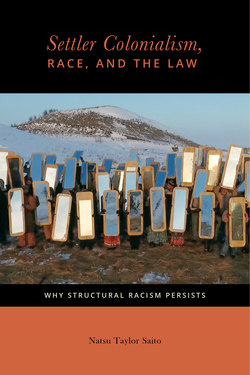Читать книгу Settler Colonialism, Race, and the Law - Natsu Taylor Saito - Страница 20
На сайте Литреса книга снята с продажи.
Silent Spaces
ОглавлениеWe turn now to some of the silent spaces in the master(’s) narrative, the voids that “raise the most profound questions.”62 There are many for whom the hegemonic American narrative rings hollow, their experiences irreconcilable with its storyline of ever-expanding prosperity. The “progress” promised by the civil rights era—the abolition of legalized apartheid, the temporary expansion of social welfare and affirmative action programs, the purported recognition of American Indians’ right to self-determination—brought a degree of material benefit to many individuals. But the disparities and exclusions have persisted, leaving people of color collectively no better off, no more secure, than we were. The dominant narrative neither adequately accounts for this reality nor provides effective remedial options, and the exclusion of the perspectives of subjugated peoples makes it almost impossible to have meaningful dialogue across racial, ethnic, or class lines.
